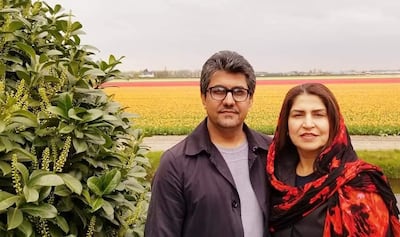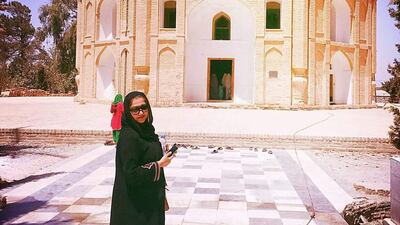As the Taliban drew closer to Kabul during their swift takeover of Afghanistan in August 2021, Habiba Ashna woke sweating from a nightmare, only to find she was about to be living one for real.
An employee at the Afghan presidential palace briefly staying in India for medical treatment, Habiba, 32, knew she could not return.
It was not the first time. Three generations of Ashna women have fled violence in their home nation, losing loved ones, their homes and savings in Afghan banks.
“The last time the Taliban came, we were forced to leave," Habiba told The National from her new home in the US, recalling her escape from the eastern province of Nangarhar in the 1990s.
"And I remember so clearly we were in a car. My mum held me on her lap and covered my head because there were bullets from Taliban fighters flying around."

Habiba’s mother, Noshaba Ashna, said the brutality of the Taliban’s first rule and its impact on women are etched into the memories of the Ashna clan.
At the time, she was a head teacher at one of Nangarhar’s prestigious girls’ schools, until it was shut down by the hardline group.
“We lost everything,” Noshaba said.
A family of activists and strong vocal women, the Ashnas left the country shortly after to escape Taliban persecution.
In the 1990s and 2022 the group made targets of activists, insisted on a strict dress code and instituted severe limits on women’s lives.
“Habiba was so young then, we left because it was no longer safe," Noshaba said. "We went to Pakistan through Kunar province, taking a very dangerous route to avoid being caught by the Taliban.”
The family describe a “difficult” life in Pakistan, but she managed to find work leading a school and as a journalist.
Later, after the US invasion, Noshaba and Habiba returned to Afghanistan, full of a new hope.
The family’s 1990 and 2021 flights from danger followed in the footsteps of another escape.
“Years before that, my grandmother was forced to leave her home and province during the Soviet conflict," Habiba said.
"She moved from province to province, to save her family, leaving behind her carefully built life.

Decades of imposed and internal conflicts in Afghanistan have created intergenerational trauma; in this case, passed down from mother to daughter.
“My grandmother had a bank account in Pashtany Bank, and when the war broke out she had to leave everything and lost the money," said Habiba, who now runs the Liberty Coalition, an organisation raising awareness of human rights breaches in Afghanistan
“Then years later my mother had an account which she had to leave behind while escaping the Taliban.
"And then when I returned to work in Kabul, I also had a bank account which I had to leave behind last year, and lost my savings.
“It's like we don’t learn anything and keep going back to Afghanistan with the hopes that we can change the situation."
Regardless, the Taliban takeover of 2021 still came as a shock. Habiba’s grandmother, Bibi Hanifa, said watching it unfold from Germany felt like a “stab in the heart”.
“I don't know when I will get to go back to my homeland, my province of Nangarhar,” she said. “But most of all I cry over the fate of the women of my country. I worry about the future of women in Afghanistan.”
Having studied in the pre-war years, Noshaba started her life in a more peaceful, developing and tolerant Afghanistan.
“My mum was like one of those girls you might see in the older pictures of Afghanistan wearing western outfits,” Habiba quipped, sharing photos of her mother and aunts in very chic attire.
But Noshaba said the nostalgia she felt was never about clothes women wore.
“I used to go to schools and universities and it was normal like any other country," she said. "We didn’t have any restrictions on girls’ rights and freedoms.
"We wore normal clothes because women’s bodies and attire were not a matter of political debate."
Noshaba says that with each round of conflict, Afghan women continue to lose.
“These are women who were politicians, parliamentarians, police, professors, doctors and engineers — women were part of every part of society," she said.
"How can we now accept that more than 50 per cent of the population can’t even leave their homes?”
“This is the story of every Afghan woman, stuck in a cycle of conflict that we did not start or fuel."
It is also why, Habiba said, Afghan women remain at the forefront of the struggle against the Taliban’s severe laws.
“We have nothing else to lose,” she said. “The reason we are more vocal is because this repetitive history has taken everything from us."
She appealed to the international community to not write off Afghan women just yet.
“We are not done yet. And we are not letting them win. Our history makes us stronger."












